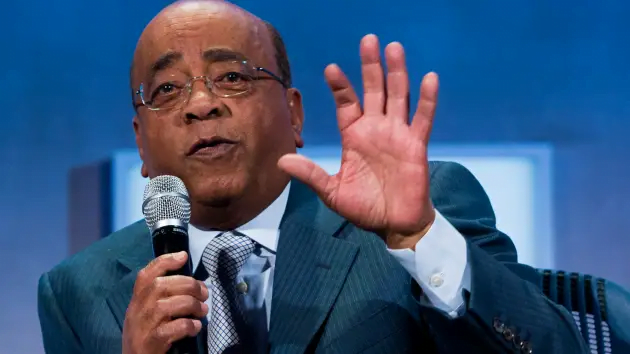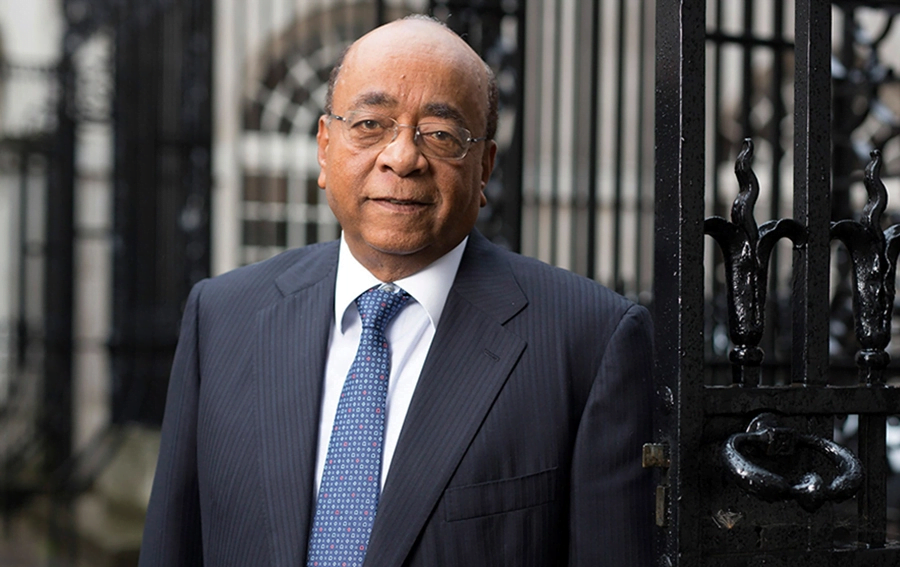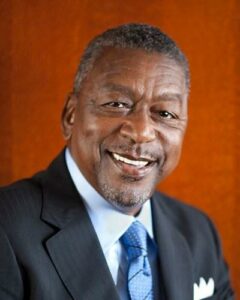Mohammed `Mo’ Ibrahim founded Celtel International in 1998, one of the first mobile phone companies serving Africa and the Middle East.
He sold Celtel to Kuwait’s Mobile Telecommunications Company for $3.4 billion in 2005.
Since then, he’s focused on fighting corrupt leadership in Africa through the Mo Ibrahim Foundation, directed by his daughter, Hadeel.
He has a majority stake in Satya Capital, a private equity fund that invests in African startups, such as Pan African digital firm company Cellulant.
According to the Forbes 2011 Billionaire List, Mo Ibrahim is worth $1.8 billion, making him the 692nd richest person in the world. Mo Ibrahim was also selected for the TIME “Top 100” list in 2008 and was ranked first in the annual Powerlist of influential Black Britons.
1946
Sudan
Of Nubian descent
1973 – Ibrahim married Hania Morsi Fadl, an Alexandria University graduate whom he had known since childhood
1974 – moves to England and gained his Bachelor’s degree from Alexandria University in Electrical Engineering
1989 – founded MSI, a consultancy and software company
2000 – MSI bought by the Marconi Company
2004 – Ibrahim sold Celtel to a Kuwait-based Mobile Telecommunication Company
2006 – Ibrahim created the Mo Ibrahim Foundation, based in London
2007 – Ibrahim was awarded an Honorary Doctorate by the University of London’s School of Oriental and African Studies
2011 – recieved an Honorary Doctorate from the University of Pennsylvania.
He was born on 3 May 1946 in Sudan, of Nubian descent, the second of five children. His family moved to Alexandria, Egypt where his father Fathi was employed as a clerk by a cotton company. He credits his mother for a focus on learning, which meant he was often top of the class in high school. “She had this obsession with education as the most important thing … The only decent way out of poverty is education. And I’m grateful for her, because she pushed us.”
When Mo Ibrahim was growing up in Alexandria he idolised scientists such as Marie Curie and Albert Einstein.
Ibrahim is credited with `transforming a continent’ and is said to be the most powerful Black man in Britain.In 2008 he was ranked first in the annual Powerlist of the most influential Black Britons.
Ibrahim was employed by British Telecom for a time, and later worked as the technical director for Cellnet, a subsidiary of British Telecom. In 1989 he founded MSI, a consultancy and software company, which in 2000 was bought by the Marconi Company. Originally the company was helping the cellular industry designing their networks, before they shifted their focus to mobile phones in the late 1990s. MSI had 800 employees, who owned approximately 30% of the stock at the point of its sale andIbrahim says he gave employees stock as a form of bonus.
In 1998, MSI spun off MSI-Cellular Investments, later renamed Celtel, as a mobile phone operator in Africa.
After some years, when Celtel needed long term source of capital, they considered doing an IPO on a reputable stock exchange, for instance the London Stock Exchange. When it became public that they considered a public offering, they received a lot of alternative offers. Many wanted to buy the company, and Ibrahim and his team decided to sell Celtel in 2004 to Kuwait based Mobile Telecommunication Company (now Zain).
Since 2010, Ibrahim has lent his support to the Broadband Commission for Digital Development, a UN initiative which aims to spread the full benefits of broadband services to unconnected peoples.
In 2006 Ibrahim created the Mo Ibrahim Foundation, based in London. In 2007, the Foundation inaugurated the Mo Ibrahim Prize for Achievement in African Leadership, with the first recipient former president Joaquim Chissano of Mozambique. In 2007 Ibrahim was awarded an Honorary Doctorate by the University of London’s School of Oriental and African Studies.
The Foundation publishes the Ibrahim Index of African Governance, ranking the performance of all 54 African countries. Until 2009, the Index took into account only the 48 countries in Sub-Saharan Africa. In 2011 he received an Honorary Doctorate from the University of Pennsylvania.
The Foundation offers scholarships at University of Birmingham, SOAS, and London Business School. These scholarships are on topics of International Development at the University of Birmingham, Governance of Development in Africa at SOAS, and an MBA at London Business School. The scholarships are initiated for African students, both Master students and Postgraduates.
Ibrahim has a Bachelor’s degree from Alexandria University in Electrical Engineering. He returned to Sudan and started working for the telephone company, Sudan Telecom. He moved to England and earned a Master’s degree from the University of Bradford in Electronics and Electrical Engineering, and a PhD from the University of Birmingham in Mobile Communications.
In 1973, Ibrahim married Hania Morsi Fadl, an Alexandria University graduate whom he had known since childhood. They are now divorced, and Fadl is a Sudanese born British radiologist, running the only breast cancer clinic in Sudan.
They have two sons Hosh and Sami Ibrahim, and a daughter, Hadeel Ibrahim, who is Executive Director of the Mo Ibrahim Foundation, Vice Chair of the Africa Centre in New York, and a Board Member of the Clinton Foundation.
Mo Ibrahim – Wikipedia
Mo Ibrahim: The African engineer who became a billionaire businessman (cnbc.com)
Mo Ibrahim, Founder and Chair | Mo Ibrahim Foundation
Mo Ibrahim | Sudanese-British entrepreneur | Britannica
Mo Ibrahim: African entrepreneur and founder of the Ibrahim Index (cnbc.com)
Meet the Sudanese-British billionaire behind the famous Mo Ibrahim Foundation – Nairametrics
Mohammed Ibrahim (forbes.com)
Mo Ibrahim, Sudanese-British billionaire | The Brave Ones – YouTube
Dr Mo Ibrahim – The Giving Pledge



